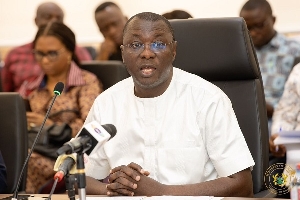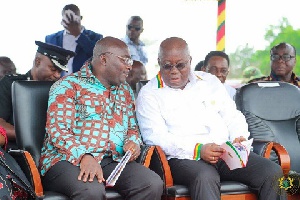- Home - News
- TWI News | TV
- Polls
- Year In Review
- News Archive
- Crime & Punishment
- Politics
- Regional
- Editorial
- Health
- Ghanaians Abroad
- Tabloid
- Africa
- Religion
- Election 2020
- Coronavirus
- News Videos | TV
- Photo Archives
- News Headlines
- Press Release
General News of Wednesday, 21 July 2010
Source: GNA
CDD expresses concern about the arrest JOY FM's Acting News Editor
Accra, July 21, GNA - The Ghana Centre for Democratic Development (CDD-Ghana) has expressed concern about the arrest and formal charge of Mr Ato Kwamena Dadzie, Acting News Editor of JOY FM, for refusing to disclose the source of a story aired by the radio station on the STX housing deal.
A statement issued in Accra and signed by Professor E. Gyimah-Boadi, Executive Director of CDD-Ghana said 93without going into the specific facts of the case, we wish to remind the State and all its agencies, including the Ministry of Information and the Ministry of the Interior, that they are enjoined by the Constitution to respect and promote respect for the rights and freedoms enshrined as well as the specific protections accorded the media".
"We note that, Article 162(4) of the Constitution states unequivocally and without limitation that, 93Editors and publishers of newspapers and other institutions of the mass media shall not be subject to control or interference by Government, nor shall they be penalised or harassed for their editorial opinions and views, or the content of their publications".
"Furthermore, the Constitution mandates the mass media to uphold the responsibility and accountability of the Government to the people of Ghana," it added.
Protecting the confidentially of one's sources is integral to the practice of journalism, demanding, under threat of arrest or prosecution, that a news medium or journalists reveal or disclose their anonymous sources strikes at the heart of the practice of investigative journalism in Ghana, especially given the habitual and entrenched culture of secrecy on the part of the State and its agencies.
The CDD-Ghana therefore, demanded the immediate cessation of the actions instituted against Mr Dadzie and JOY FM.
"We demand a stop to the continued application of Sections 208, 183, 183A and 185 of the Criminal Code of 1960 and call on the Government and Parliament to move to repeal these archaic and obnoxious provisions of our Criminal Code," it added.
As a result of the private initiative and enterprise of media owners and publishers and other practitioners of journalism, the media space in Ghana has expanded progressively since the coming into force of the 1992 Constitution.
The repeal in 2001 of the repugnant Criminal Libel Law, which had been used to hound and harass the media in the 1990s, was expected to usher the country into a new era devoid of censorship and other media repressive actions by the state and its agencies.
It is therefore alarming that the Ghana Police Service, in just a few months, has had cause again to activate the moribund, anti-free press and anti-democratic provision of Section 208 of the Criminal Code, 1960, which is likely to cause fear and alarm to the public or to disturb the public peace, knowing or having reason to believe that the statement, rumour or report is false."
The statement said this action of the Police is a retrograde as Section 208 itself.
It said Section 208 of the Criminal code of 1960 is a throwback to the era of authoritarian rule in Ghana.
"Unfortunately, it is not the only such law still existing on our statute books. Sections 183, 183A and 185 are among the existing laws that have no place in our Fourth Republic. So-called 91false news' statutes similar to Section 208 have been struck down or repealed as unconstitutional impediments to free speech in a number of Commonwealth countries. They are also routinely criticised by the UN Human Rights Committee as violating international instruments protecting free speech, such as the International Covenant on Civil and Political rights (of which Ghana is a signatory).
The statement said Section 208 is clearly offensive to the spirit of the 1992 Constitution. Its continued existence in our statutes and revived application clearly threatens to undermine the gains Ghana has made in promoting and protecting media freedoms and advancing democracy in the Fourth Republic 96 something for which the country has received international acknowledgement and praise.










